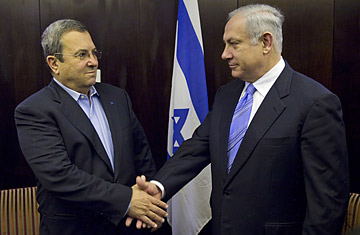
Israeli Defense Minister and Labor Party leader Ehud Barak, left, and Prime Minister–designate Benjamin Netanyahu shake hands during a meeting in Jerusalem
In a stormy meeting of Israel's Labor Party on Tuesday night, Ehud Barak pushed his party into joining a right-wing coalition government led by Likud's Benjamin Netanyahu. With Labor on board, Netanyahu's coalition, stitched together with an array of ultra-Orthodox and nationalist parties, now has a majority in the 120-seat Knesset. The hawkish Likud leader is likely to be sworn in as Prime Minister next week, ushering out his disgraced predecessor, Ehud Olmert, who faces possible corruption charges.
Having Barak, currently Defense Minister, at his side will give Netanyahu a veneer of international respectability. The Obama Administration and European capitals are horrified that the other members of Netanyahu's coalition oppose the idea of Palestinian statehood. (See pictures of heartbreak in the Middle East.)
Convincing Laborites to join ranks with their longtime ideological rivals on the right was a tough sell for Barak. During his speech at the party convention in Tel Aviv, Barak's voice sounded squeaky and defensive. He called for "national responsibility," but this was dismissed by booing younger cadres as rank opportunism — Barak wanting to hang on to his berth as Defense Minister at the expense of his party's ideals and character. As Labor secretary Eitan Cabel told TIME, "The ambitions of Barak are killing the Labor Party, and I told him that."
Labor was the party of Israel's socialist founders, and at the convention there were glimpses of the old stalwarts: sun-creased kibbutzniks, leather-capped union men, teachers and a few men and women of dogged ideals. But they were outnumbered by party apparatchiks, with their cologne and insipid handshakes, few of whom appeared ready to give up their cushy government posts and influence. Says Shelly Yachimovich, a hard-hitting ex–radio journalist who is now one of Labor's rising stars: "A strong motive was clinging to power and the good life. Some Labor people believe their genetic code cannot survive outside the government." Labor's younger cadres squawked "like slaughtered chickens," according to Haaretz columnist Yossi Sarid. In the end, though, Barak got his mandate to join Netanyahu, with 680 delegate votes to 507. (See pictures of 60 years of Israel.)
Had he lost the vote, Barak, the diminutive ex-general and decorated war hero, would likely have been driven out as party leader, his political career at an end. This way Barak stays in power, and Labor will get the ministries of defense, agriculture, industry, trade and welfare. But the cost has been high. One respected columnist, Ben Caspit in Maariv, wrote, "The Labor Party signed its own death certificate."
The younger cadres, the so-called rebels who opposed the marriage with Likud, say they won't split the party for now. But they may choose to vote against Netanyahu, and their own party chief, Barak, on key issues. (See pictures of Israeli soldiers in Gaza.)
Netanyahu has finally pieced together a majority of at least 66 Knesset seats. But there are no guarantees that his coalition will last its four-year term. Members of his own Likud Party are grumbling that Netanyahu has given away too many ministerial portfolios to woo both Labor and the hard-right party Yisrael Beitenu of Avigdor Lieberman, who is likely to become the next Foreign Minister, despite his extreme anti-Arab views. (See a TIME video on Lieberman.)
On the upside, with Barak as his ally, Netanyahu has a strong Defense Minister to stand up to the Iranian nuclear threat and to the Hamas militants ruling Gaza. Barak also says that while Netanyahu is against a two-state solution with the Palestinians, he has persuaded the Likud leader to make two key concessions that will please Washington: ending the building of illegal Jewish settlements in the Palestinian territories and promising to abide by the U.S.-sponsored peace accords that Israel signed with the Palestinians. On Wednesday, with Barak's support in mind, Netanyahu toned down his usual hawkishness, telling Israeli and Arab businessmen, "I'm a partner for peace." Next week Israelis will have a new Prime Minister and Cabinet, and a season or two of political stability. But Barak's opportunism may have set the historic Labor Party on a slide into irrelevance.
— With reporting by Aaron J. Klein / Tel Aviv
